June marked the 25th Anniversary of Gramercy! Thank you to our valued investors, trusted business partners and team members without whom this milestone could not have been reached. We are excited for the opportunities we see ahead, and look forward to continuing to deliver upon our mission to have a positive impact on the well-being of our clients, portfolio investments (and their communities) and our team members.
Contents
Market Overview
Macro Review
The ECB paused monetary tightening after ten consecutive hikes. The emphasis was instead on a gloomier growth outlook. European government bonds heaved a sigh of relief with no tweaks made to PEPP reinvestments or the minimum reserve requirements. After weak PMIs earlier in the week, President Lagarde had already stated that the Euro-zone will stagnate over the next quarters, even as risks will become more balanced. The ECB decision did, however, drag U.S. Treasury yields lower, after a brief spike on stronger 3Q GDP at 4.9% (expectations were 4.5%). The added complication into the Bank of Japan interest rate decision next week comes after a hot Tokyo CPI print at 3.3%, which was well ahead of consensus (2.8%). Officials are mulling a tweak to YCC given the volatility in JPY above 150, just as market participants have long expected the policy to be scrapped. Finally, Bill Ackman and Bill Gross made notable headlines, in that the former removed a U.S. Treasury short and the latter advocated going long U.S. Treasury risk. The troubling backdrop comes amid U.S. earnings season. After all, the Magnificent Seven are now down more than 10% in the past twelve sessions. Across EM, the first round of Argentinian elections saw Sergio Massa clinch a majority over Javier Milei and push Patricia Bullrich out of contention. The focus shifts to the second round on November 19. Philippine’s BSP took off-cycle action, hiking policy rate by 25bps. The concern was around second round effects with inflation expectations. Turkey’s Central Bank continues to impress markets after raising domestic interest rates by 500bps to 35%, while Ukraine surprisingly cut 400bps to 16%. The impact of Ukraine’s decision is limited given the overnight interest rate was 16% before the decision and the 3-month deposit rate is 400bps over the base rate, therefore it is mostly a symbolic move. More pressing was Euroclear’s decision to consider transferring around $3bn in profits from frozen Russian assets in 2023 to Ukraine. The European Commission’s legal basis of transferring proceeds to Ukraine will begin in December. A secondary development is Slovakia’s newly elected President, who is sympathetic to the Kremlin, called for halting military aid to Ukraine. Next, Egypt’s Central bank is close to securing $5bn in new deposits from Saudi Arabia and the UAE, which allowed for a brief rally after S&P downgraded the sovereign to B- from B flat. Having said that, Moody’s downgraded Egypt to Caa1 which limited any material market impact in response to the S&P development. Finally, Zambia published its restructuring proposal, in the same week as Suriname.
EM Credit Update
Emerging markets sovereign credit (cash bonds) ended the week up 0.7% with credit spreads 4bps tighter. Sovereign outperformers were Suriname, Zambia and Bolivia, while Argentina, Ethiopia and Tajikistan underperformed. JPM also updated its EM corporate default forecast for 2024 and expects defaults to decline to 4.0% and remain below the long-run historical average of 4.2% (forecasted to end 2023 at 9.7%). Secondly, the trustee of Country Garden Eurobonds issued a default notice after the coupon associated with the 6.15% 2025 notes was not paid. Subsequently, the CDS Determinations Committee then agreed that the default would trigger CDS, which means participants are now waiting for the CDS auction date.
The Week Ahead
Key fixtures next week include the Federal Reserve, Bank of Japan and Bank of England interest rate decisions. We can also expect earnings season to be lively as the dichotomy between some companies suggesting the U.S. economy is performing very well, to others suggesting it is far more lackluster, divide the room. Of equal importance is China’s 3rd Plenum of the 20th Central Committee, and while it is a closed-door affair, any additional policy support ought to be well received. A lesser focus will be on China’s Manufacturing PMI, although this is expected to hover close to 50. EM interest rate decisions are due out of Czech Republic (7.0%), Egypt (19.25%), Malaysia (3.0%) and Pakistan (22.0%). The focus remains on inflation, where we can expect particular interest in Turkey’s release next Friday covering the month of October. Finally, South Africa’s annual Medium-Term Budget Policy Statement (MTBPS) commences on November 1 by Minister Enoch Godongwana, which is often regarded as the “mini budget statement”.
Highlights from emerging markets discussed below: Sergio Massa and Javier Milei head to a runoff in Argentina’s Presidential Elections and Beijing steps up economic support measures, endorses a larger budget deficit.
Fixed Income
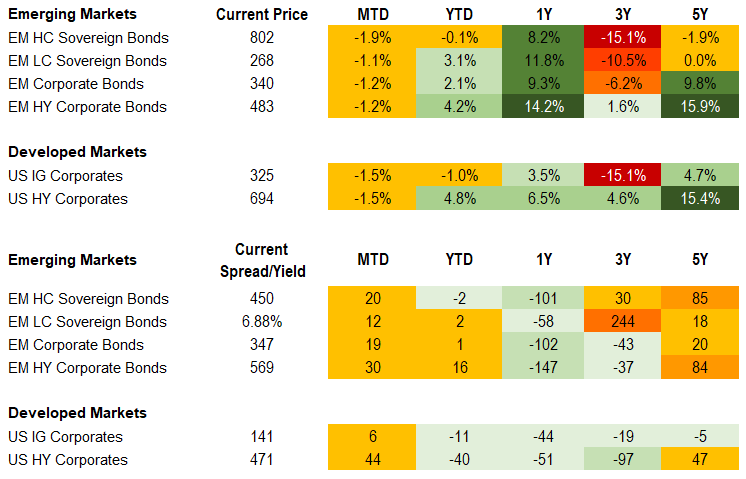
Equities
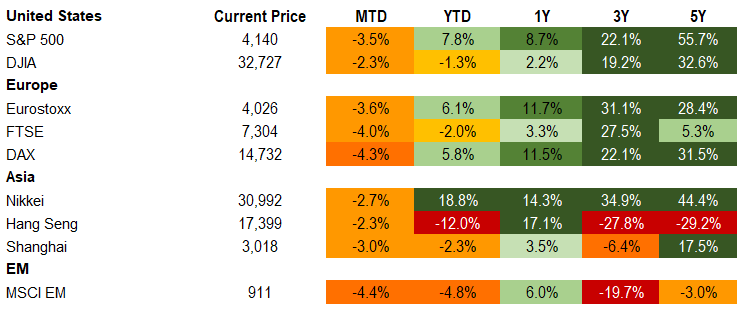
Commodities

Source for data tables: Bloomberg, JPMorgan, Gramercy. EM Fixed Income is represented by the following JPMorgan Indicies: EMBI Global, GBI-EM Global Diversified, CEMBI Broad Diversified and CEMBI Broad High Yield. DM Fixed Income is represented by the JPMorgan JULI Total Return Index and Domestic High Yield Index. Fixed Income, Equity and Commodity data is as of October 27, 2023 (mid-afternoon).
Emerging Markets Weekly Highlights
Sergio Massa and Javier Milei head to a runoff in Argentina’s Presidential Elections
Event: Economy Minister Sergio Massa delivered a major surprise relative to market expectations, winning the first round of Argentina’s Presidential Elections with close to 37% of the vote, followed by libertarian Javier Milei with 30%. Center-right candidate Patricia Bullrich received 24% and was eliminated.
Gramercy commentary: The dominant market narrative anticipated that Mr. Milei, a firebrand libertarian campaigning to abolish the Central Bank and dollarize the economy, would take the lead and even envisioned the possibility that he would win outright in the first round. Instead, Massa outperformed in a major way, collecting 9.6m votes versus Milei’s 7.9m, whom he will now face in a runoff on November 19th. Ms. Bullrich from the center-right “Together for Change” coalition came in third with 6.3m votes. In the days after the vote, Bullrich joined former President and market favorite Mauricio Macri in formally endorsing Milei for the second round. However, despite the endorsement, it is unlikely that all of Bullrich’s votes from the first round will go to Milei, in our view. Buoyed by his very strong performance in the first round, Massa probably holds the upper hand ahead of the runoff, but we expect an extremely tight second round that could be decided by a razor thin margin. If Massa wins, we expect that he will focus on reviving IMF cooperation to ensure near-term macroeconomic stabilization. If Milei wins, we believe he is likely to moderate his message on economic policy in the context of his now formal political partnership with Macri and Bullrich, but still insist on some emergency economic measures in the near-term. Governability is likely to be significantly stronger under the Massa scenario, from our perspective. Overall, we are of the view that under either candidate, Argentina is likely to transition toward a more market-friendly economic policy management.
Beijing steps up economic support measures, endorses a larger budget deficit
Event: The Standing Committee of China’s National People’s Congress greenlighted an increase in the fiscal deficit ratio from 3% to 3.8% of GDP and approved the issuance of 1t yuan ($137bn) of additional central government debt in the fourth quarter.
Gramercy commentary: Although the 0.8% of GDP of additional fiscal spending does not come close to the “bazooka” stimulus packages of past years, it still constitutes meaningful policy support for the Chinese economy moving into 2024. Such mid-year budget revisions in China are unusual, having been previously done only a handful of times during emergencies, such as in the aftermath of the 2008 earthquake in Sichuan province and the 1998 Asian Financial Crisis. It signals that while the structural goal of de-leveraging/de-risking the economy remains valid, the authorities in Beijing are also eager to see an improvement in economic activity next year from around 5.0% YoY GDP growth penciled for this year. The Chinese economy has faced significant challenges this year in the context of its struggling property sector, falling exports, and waning private sector confidence. Markets are hopeful that continued policy momentum at the central government level could extend into next year and boost the recovery momentum in the Chinese economy, a key driver of external demand for many emerging markets.
Emerging Markets Technicals
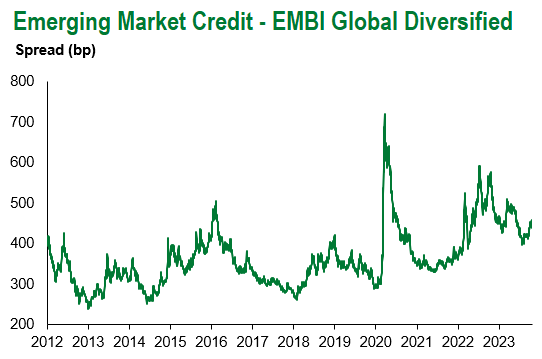
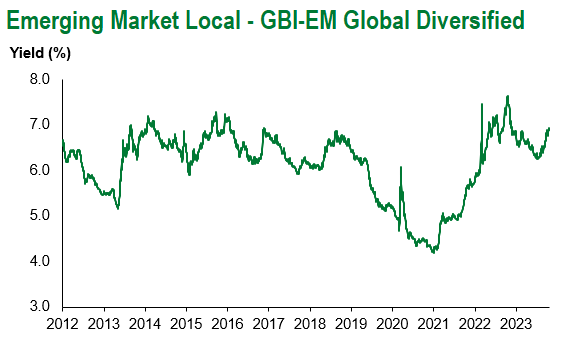
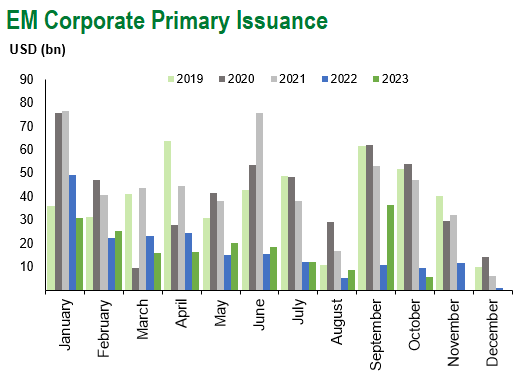
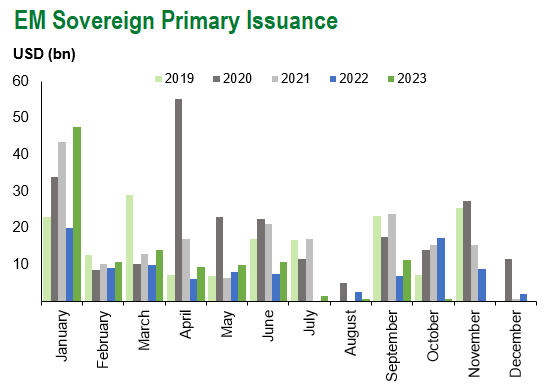
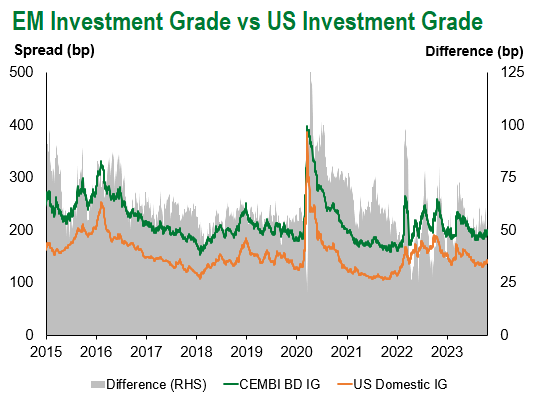
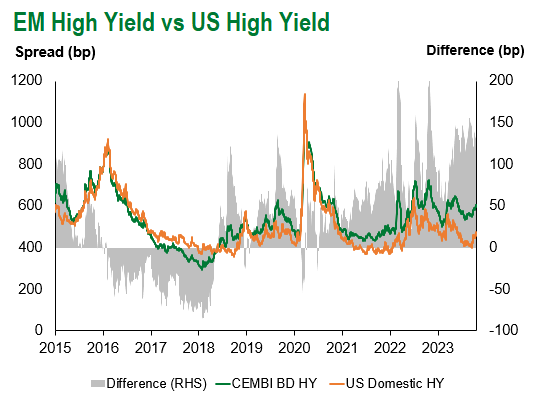
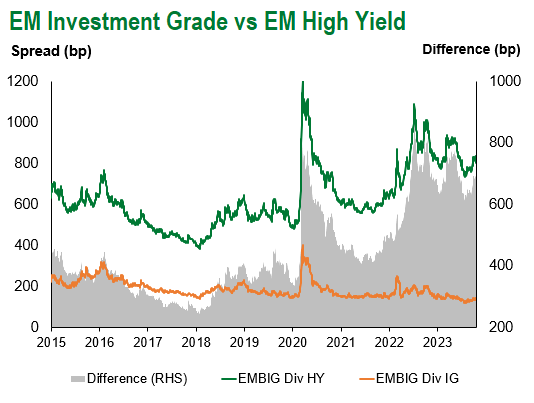
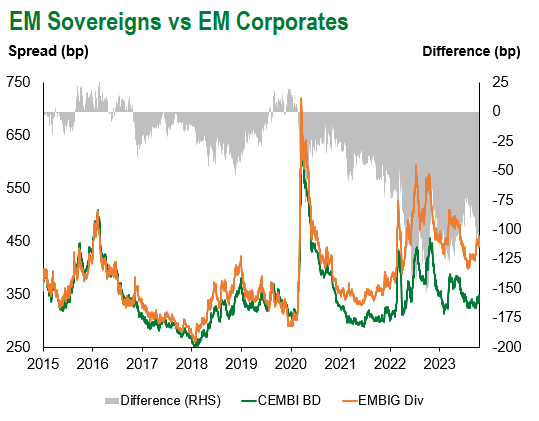
Emerging Markets Flows
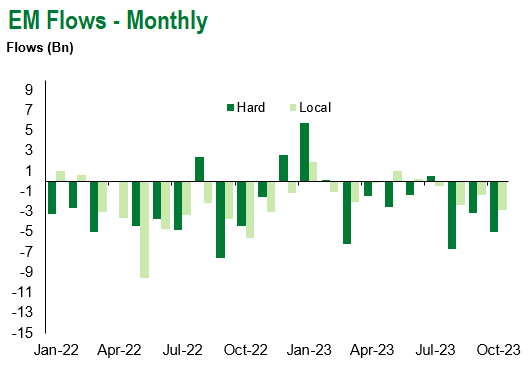
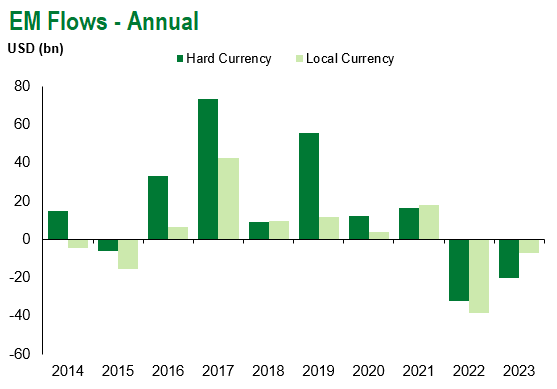
Source for graphs: Bloomberg, JPMorgan, Gramercy. As of October 27, 2023.
For questions, please contact:
Kathryn Exum, CFA ESG, Director, Co-Head of Sovereign Research, [email protected]
Petar Atanasov, Director, Co-Head of Sovereign Research, [email protected]
James Barry, Director, Deputy Portfolio Manager, [email protected]
This document is for informational purposes only. The information presented is not intended to be relied upon as a forecast, research or investment advice, and is not a recommendation, offer or solicitation to buy or sell any securities or to adopt any investment strategy. Gramercy may have current investment positions in the securities or sovereigns mentioned above. The information and opinions contained in this paper are as of the date of initial publication, derived from proprietary and nonproprietary sources deemed by Gramercy to be reliable, are not necessarily all-inclusive and are not guaranteed as to accuracy. This paper may contain “forward-looking” information that is not purely historical in nature. Such information may include, among other things, projections and forecasts. There is no guarantee that any forecasts made will come to pass. Reliance upon information in this paper is at the sole discretion of the reader. You should not rely on this presentation as the basis upon which to make an investment decision. Investment involves risk. There can be no assurance that investment objectives will be achieved. Investors must be prepared to bear the risk of a total loss of their investment. These risks are often heightened for investments in emerging/developing markets or smaller capital markets. International investing involves risks, including risks related to foreign currency, limited liquidity, less government regulation, and the possibility of substantial volatility due to adverse political, economic or other developments. References to any indices are for informational and general comparative purposes only. The performance data of various indices mentioned in this update are updated and released on a periodic basis before finalization. The performance data of various indices presented herein was current as of the date of the presentation. Please refer to data returns of the separate indices if you desire additional or updated information. Indices are unmanaged, and their performance results do not reflect the impact of fees, expenses, or taxes that may be incurred through an investment with Gramercy. Returns for indices assume dividend reinvestment. An investment cannot be made directly in an index. Accordingly, comparing results shown to those of such indices may be of limited use. The information provided herein is neither tax nor legal advice. Investors should speak to their tax professional for specific information regarding their tax situation.
